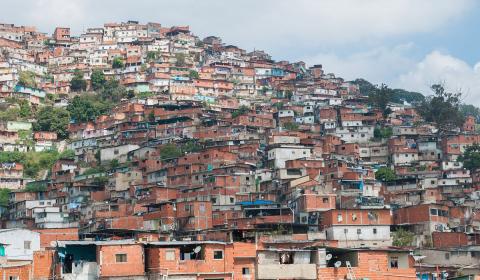
Fr. Leo Shea, MM, reflects on the challenges facing our country and world at this time and the hope brought by this week's readings.
“Oh Lord, do come along in our company…and receive us as your own,” prayed the prophet and religious leader Moses.
During a time of great hardship, and uncertainty, Moses bowed down and prayed, “If I find favor with you, Oh Lord, do come along in our company and receive us as your own.” Today, we truly need God’s accompaniment, and especially God’s healing graces to cure our physical sicknesses and our social ills.
The coronavirus pandemic has killed three members of my family. One was an Irish Jesuit Missionary. Another was a maternity nurse for forty years, and the third family member a nurse for thirty plus years. In addition, eleven Maryknoll priests and one Brother, who were my colleagues, have died. I knew them all. The virus has taken several close friends. I have prayed for them when I heard they were sick and then when their children informed me of their passing, I cried and, at times, sobbed. It has been an overwhelming experience of loss, deep pain and sadness and also a time of uncertainty.
I trust that Moses’ plea, “Oh Lord, receive us as your own,” is reflected in John’s words in the Gospel: "God so loved the world that he gave His only Son, so that everyone, who believes in him might not perish but have eternal life.”
I reflect on the words, “Everyone who believes.” My family, friends and colleagues who died from the virus believed in Jesus. They demonstrated their belief through their vocations and their lives. The words from the Gospel of John are consoling and uplifting for me and I am sure for you, too. God loved the world so that we might not perish but have life. From womb to the tomb, we are received as God’s very own. Yes, God’s love does accompany us.
During these uncertain times, I remember a great woman who was a healer of the sick and comforter of the poor. I chauffeured Mother Teresa of Calcutta through the slums of Caracas, Venezuela many years ago. As a missionary disciple of Christ she picked up thousands of dying people in the streets of Calcutta, India and later in Venezuela and across the world. Mother Teresa’s patients died from the permanent pandemics of poverty, dehumanization and indifference. When Mother was asked, “With so many humans living in poverty and sickness, where do you begin?” She responded, “You start with one at a time.”
I also heard her say that you do the best you can do as an individual to relieve the suffering and pain and restore human dignity to those around you. As one person pointed out, the coronavirus and other pandemics are not an equalizer, but a magnifier showing the inequalities of our society. We learned this week that Mr. George Floyd, who was murdered by police, was also sick with the coronavirus. During these uncertain and trying weeks, Pope Francis encouraged and challenged us by saying, “Our suffering during the coronavirus crisis will have been in vain if we fail to build a more just, more equitable, more Christian society.”
This week, Maryknoll Father Rick Bauer spoke in a webinar about the dual pandemics in Kenya, namely AIDS and coronavirus, affecting thousands of slum dwellers in Kenya. Rick shared a thought about grief. He said, “Grief is really just love.”
In Venezuela, I saw grief expressed culturally in the traditional burial rites of the poor. When the casket is removed from the hearse at the cemetery, the pallbearers carry the casket on their shoulders. They take two steps forward and one step back. As they dance toward the open grave, they do a shuffle or strut. When they arrive at the grave, they dance back and forth. It is a powerful gesture that they do not want to say good bye to their loved one. For the Venezuelan people this ritual is their grassroots liturgical celebration of mourning and grief.
In conclusion, our Christian faith motivates us; we believe we receive the Holy Spirit in the sacrament of baptism not just for oureselves, but for the common good. And our Catholic Social Teaching instructs us to do the corporal works of mercy by visiting the sick and burying the dead and working to “build a more just society.”
The Mystery of the Holy Trinity, which we celebrate today, speaks of relationships between three persons in one God and our relationships with each other, with God and with those in sickness and suffering from many forms of discrimination.
Let us join our prayer with the words of Moses, “Oh Lord, pardon our wickedness and sins” of racism and indifference, “and receive us as your own.” We also pray in this unsettling time asking God to protect all from the global pandemic and to bestow especially upon our youth blessings of renewed hope and justice for all.
